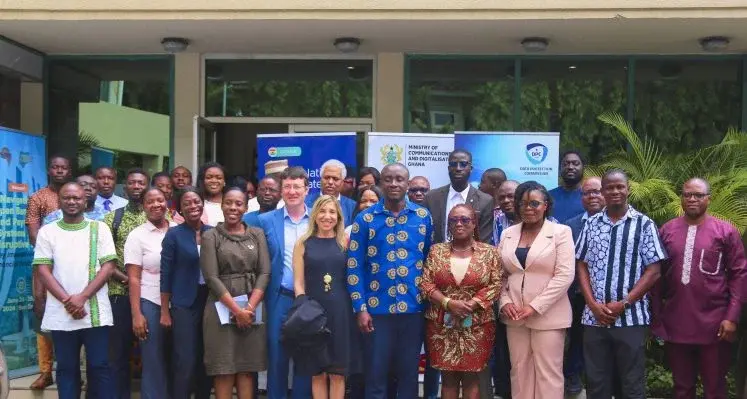The Government of Ghana, in collaboration with the European Union and Smart Africa, has successfully concluded a National Validation Workshop to develop a National Data Strategy
This significant milestone is aligned with Ghana’s Long-term National Development Plan (2018-2057), the National Medium-term Development Policy Framework (2022-2025), and the country's vision for sustainable development.
The workshop aimed to bring together stakeholders in the data governance ecosystem to shape Ghana’s data-driven future. Its objective was to establish a comprehensive national data strategy that includes key elements such as data governance structure, legal and ethical considerations for data collection, usage, storage, and protection, as well as data infrastructure and capacity building.
“Data is a valuable asset across all sectors capable of driving economic growth when managed effectively. Developing a data strategy is crucial to achieving this goal, and we are proud to collaborate with our partners to establish this framework in Ghana and subsequently in other member countries,” commented Lacina Koné, Smart Africa CEO.
The two-day validation workshop involved stakeholders in Ghana’s data ecosystem who reviewed and validated the draft strategy document and provided inputs into the implementation roadmap for the data strategy, paving the way for the country’s data-driven future.
“This nation is well into the bold, deliberate initiatives to digitalise the economy, believing that deploying critical IT systems and technologies acquired will best maximise the use of data by unlocking its potential, promoting data sharing, analytics, and reuse for the general public good. With an increasing adoption of advanced technology in the management of data, the prioritisation of data governance is critical to the success of the digitisation effort,” declared Hon. Charles Acheampong, Deputy Minister of Communications and Digitalisation of Ghana.
Commenting on the national data strategy, Patricia Adusei-Poku, executive director of data protection commission, Ghana said, “The Ghana Data Protection Commission has positioned itself as a regional trailblaser and a national forefront enabler of appropriate and authorised processing of quality data in a people-centric digitised ecosystem. The DPC has developed various data strategies to support Data Controllers and Subjects to encourage accountability from all stakeholders.”
Anna Lixi, head of governance and security at the European Union in Ghana, emphasised, “Decisions based on data can greatly improve people’s lives; data can uncover patterns and market trends, making it possible to address problems and leverage opportunities; business start-ups – including those led by Ghana’s young people – may greatly benefit from having access to the right data.”
“Data is the new oxygen of development. It is a powerful enabler for digital innovations, job creation, and enhancing the openness, effectiveness, and inclusiveness of the delivery of basic services to local communities. We congratulate the Government of Ghana and its partner, Smart Africa for developing the Ghana National Data Strategy – a real milestone for leveraging the power of data for sustainable development,” added David Robert, Program Manager, Digital Transformation Center, GIZ Ghana.
This initiative was made possible through collaboration between Smart Africa, the Government of Ghana, the African Union, the European Union, BMZ, GIZ, D4D Hub, and Global Gateway.
The Republic of Benin is undertaking a similar journey to develop its own National Data Strategy and, in addition to contributing to the validation workshop, conducted a peer learning exchange with their Ghanaian counterparts. This effort aligns with continental initiatives to harmonise data policies, spearheaded by the African Union Commission through the Continental Data Policy Framework.






















